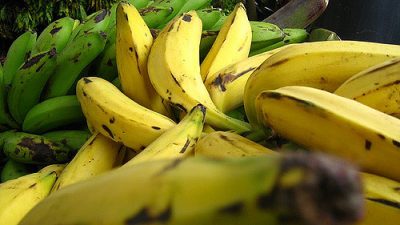The plantain is black. It is black. It is black yet it has lightened. It is black yet it feels healthy elastic. The peel hardens up and goes cold. It is a black plantain yet there are signs of stirring life. New grassy hairs the color of wood shavings uncurl from the place where the stem meets its congealed head. The plantain is black yet the white presence of mold persists not endeavoring to emerge from the stem’s barky crevices. The plantain is black and looking inside the eyelet hole on the tip wide enough to shine a light into all you can see is black. It is black. Plants luxuriate in the spring sun cherry blossoms burst london planes show their yellowgreen buds yet this plantain is black. It is black yet if taken in proportion the coverage of the fruit of various shades of red and brown nearly match the surface area which is black. The plantain has gone black and yet this is considered an unadvanced stage of ripeness platano maduro merely mature before the final phase platano negra. The platano negra is not merely black—the peel even clamps down like a dead man’s grasp. A yellow plantain is only considered semiripe yet this plantain is black. It is black. This plantain is a black plantain.
It’s a cold dark thing this plantain. A cold thing a dark thing and parched among all this spring springing. This plantain lies on a table on top of a computer beside a glass of still water. A glare of the sun glances off its peel—in the glass of water there is a reflection of white treeflowers and green buds. This plantain here is colder than the air and drooping under the weight of its grey. The stiff peel feels more like a tusk than it does a husk for softfruit. Of course some things still happen as the days go by the blackness lightens the peel stiffens the wood occupying either end musters for a final conquering march to the middle but the world blooms outside. The plantain’s real identity is a hand closing while the rest of the world cracks open. What does a fruit whose sole life is a single axis of preservation know about spring? If this plantain had children maybe they could teach it how to use a computer. But orphaned and without offspring there is only this fruit on this computer with water astride.
I sit with this plantain. Pause a moment to remember. It’s been green then blooming yellow then brown then black it’s been firm then soft then oversoft then hard again now it fits well in my pocket better than it did that first day of the fruitseller when it cocked its stem and seemed to choose me. This plantain was made of harder stuff than other fruit. It does not decay it petrifies. Today is another of those sherbet days with the sun standing apart from the clouds. It’s been cold and hot and cold again but now that spring sliver stands just on the boundary—a lean 70. It would be immoral to carry this frozen thing through all the bursting of the season. One final task before burying this plantain in the garden for its witchy potency to protect and preserve. I will split this palsied peel and witness its gift. I feel the leather where it has hardened over the bread I thumb the sticky stem and the rivetshaped tip and all of it is hard and dark and dead. In my other hand a pair of kitchen shears thickbladed with a fat plastic handle. I close the shears around the tip. I run the blade beneath the peel to pull aside the curtain and when I finally see it—O my pleasure—
The truth is I don’t remember nothing. Once the peel fell away the fruit revealed finally for the one so long striving—its description defies my meager language. More like the aftervision of a dream once vivid all needs fulfilled all desire met wholesomely all unwholesome lusts too in their fractions made whole once again. I saw all the things I ever lost and all people who’ve gone away. All my enemies were there. All those who ever did me harm and the ones I’ve wronged too. I’ll make an attempt at a single truth through all this collection of lies. Broad. The thing was broad but that falls short. Bright. The thing was bright but the daylight dulled. Whole. The thing was whole but my eyes could not behold its entirety at one time. Yellow brown or black? I thought I would darken and die from looking—but I was comforted by the plantain in my hand. Let the thing drop. With my poverty of words I mark its departure in humblest description of time and place and circumstances. Buried here in springtime under all this sun. May 2018 Ditmas Park Brooklyn.
